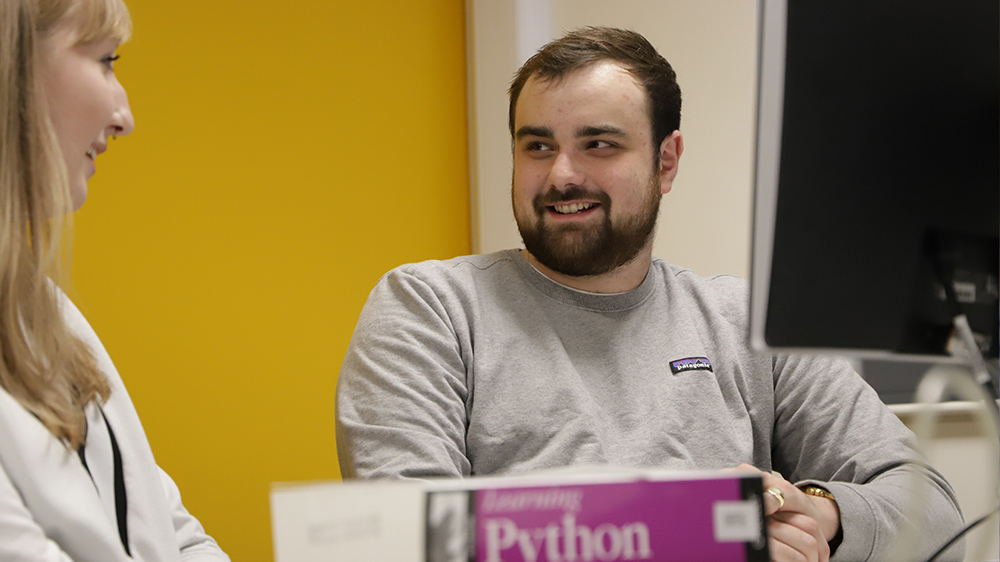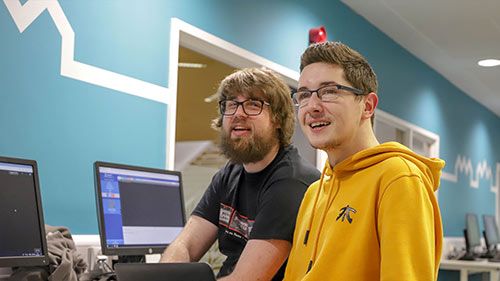Search
Cyber Security BSc (Hons)
Study level: UndergraduateHNC/HND courses

As a result of the continuing digital revolution, computer systems are involved in just about every aspect of modern life.
Year of entry
Location
CU Scarborough (Scarborough)
Study mode
Full-time
Duration
4 years sandwich
3 year - Degree
2 year - HND
1 year - HNC
Course code
I107 / I106
Start date
September 2024
November 2024
January 2025
March 2025
May 2025
June 2025
Course overview
As the number of mobile users, digital applications, and data networks increase, so has the number of potential risks and threats, resulting in the need for talented professionals to secure and protect systems and data.
Our Cyber Security BSc (Hons) course is designed to produce high quality graduates who can contribute effectively in one of the highest growing sectors in the UK. The course offers real-life tools and challenges, giving you the opportunity to become an independent learner through practical projects and advanced teaching methods.
Why CU Scarborough
We offer a style of education which is flexible and designed to fit around your life, allowing you to benefit from a modern, forward-thinking higher education institution, reinforced by the quality and reputation of Coventry University. We are dedicated to making higher education accessible and enjoyable to everyone and our courses cover one module at a time, allowing you to become a specialist in each topic before moving onto the next.
What you'll study
This course examines the principles and threats which underpin computer systems, networks and the software development process. Throughout the programme you will become competent and confident in a range of prevalent topics, such as operating systems, network security, programming language, penetration testing, ethical hacking and more.
We regularly review our course content, to make it relevant and current for the benefit of our students. For these reasons, course modules may be updated.
How you'll learn
This course is available as a full-time three-year or optional four-year sandwich course, the latter incorporating a work placement or study year in a related field2.
Our teaching methods are varied, offering a number of teaching styles to suit the needs of our students, so in addition to lectures, we also utilise a blended learning approach, including online aspects, workshops and group work. Additional support is available via email and our online learning platform.
Progression through the modules develops knowledge and skills, including communication (written and oral), study skills, research methods, project management, presentation and career development. We will also encourage you to consider your employability and/or entrepreneurial development.
Unlike traditional institutions, there are no end of year exams. Instead, learning is assessed through coursework and phase tests, which is more reflective of our learning model.
You can expect up to 20 hours of learning activities per week, made up of face-to-face teaching, individual and group tutorials, online classes and independent learning.
The learning outcomes of modules, assignments and projects will be clearly stated. Your work will be marked according to how well you achieve these learning outcomes and your feedback will refer to each outcome and your academic skills, as well as providing an overall percentage grade.
Teaching contact hours
The number of full-time contact hours may vary from module to module, however, on average, it is likely to be around 20 contact hours per week. Additionally, you will be expected to undertake significant self-directed study of approximately 30 hours each week, depending on the demands of individual modules.
The contact hours may be made up of a combination of face-to-face teaching, individual and group tutorials, and online classes.
As an innovative and enterprising institution, the university may seek to utilise emerging technologies within the student experience. For all courses (whether on-campus, blended, or distance learning), the university may deliver certain contact hours and assessments via online technologies and methods.
Since COVID-19, we have delivered our courses in a variety of forms, in line with public authority guidance, decisions, or orders and we will continue to adapt our delivery as appropriate. Whether on campus or online, our key priority is staff and student safety.
Assessment
The learning outcomes of modules, assignments and projects will be clearly stated. Your work will be marked according to how well you achieve these learning outcomes and your feedback will refer to each outcome and your academic skills as well as providing an overall percentage grade.
Assessment methods vary and may include, practical class and project performance, written practical reports, project thesis, laboratory experiments, tutorial tasks and assessments, which take place during each six-week block.
Entry requirements
Typical offer for 2024/25 entry.
Tuition Fees
| Student | Full-time | Part-time |
|---|---|---|
| UK, Ireland*, Channel Islands or Isle of Man | £7,950 per year | Not available |
| EU | £7,950 per year with EU Support Bursary** £16,800 per year without EU Support Bursary** |
Not available |
| International | £16,800 per year | Not available |
If you choose to do a work placement2, you should consider travel and living costs to cover this. There is also a tuition fee3 of £1,250 that will cover your academic support throughout your placement year.
For advice and guidance on tuition fees and student loans visit our Undergraduate Finance page and see the University’s Tuition Fee and Refund Terms and Conditions.
We offer a range of international scholarships to students all over the world. For more information, visit our International Scholarships page.
Tuition fees cover the cost of your teaching, assessments, facilities and support services. There may be additional costs not covered by this fee such as accommodation and living costs, recommended reading books, stationery, printing and re-assessments should you need them.
The following are additional costs not included in the tuition fees3:
- Any optional overseas field trips or visits: £400+ per trip.
- Any costs associated with securing, attending or completing a placement (whether in the UK or abroad).
*Irish student fees
The rights of Irish residents to study in the UK are preserved under the Common Travel Area arrangement. If you are an Irish student and meet the residency criteria, you can study in England, pay the same level of tuition fees as English students and utilise the Tuition Fee Loan.
**EU Support Bursary
Following the UK's exit from the European Union, we are offering financial support to all eligible EU students who wish to study an undergraduate or a postgraduate degree with us full-time. This bursary will be used to offset the cost of your tuition fees to bring them in line with that of UK students. Students studying a degree with a foundation year with us are not eligible for the bursary.
Facilities
We’ve spent £14 million on a brand new campus building. It’s a purpose-built, state of-the-art development that is one of the most modern facilities4 in the UK.
It includes a library, IT suites, mock law court, engineering and science labs, cafe and lots of individual and group study spaces. Next to us is Scarborough’s new leisure village. The complex includes an Olympic legacy swimming pool, sports hall, fitness suite, all weather pitches and the new Scarborough Athletic football ground.
Careers and opportunities
Overall, the cyber security course at CU Scarborough provides students with a strong foundation in cybersecurity, industry-relevant skills, work-based learning, and career guidance. While we cannot guarantee specific careers or opportunities, the course prepares students for a variety of cybersecurity roles and provides them with the tools they need to succeed in the industry
An important vocation in the modern digital age, Cyber Security professionals work with creativity and analytical thinking to understand how systems can be broken, protected and used.
A career in cyber security is challenging, dynamic and highly transferable, meaning graduates may have the opportunity to work internationally throughout their careers as there is a recognised global demand for trained specialists.
Cyber security is a rapidly growing market, with plenty of scope to develop a very lucrative career. Graduates from this course can enter a number of specialisms, such as a Cyber Security Consultancy, Software Developer/Programming, Cyber-Crime Investigation or Digital Forensics Analysis.
Where our graduates work
GCHQ, Severfield, Askew Brooks
How to apply
You may also like










